– Proceed in a hybrid method combining online and offline
– State-of-the-art technologies, innovations, and digital services that guarantee the convenience and speed of human life are the main exhibit items.
COMEX, an ICT specialized exhibition in Oman, was held face-to-face for the first time in about three years. COMEX is Oman's largest ICT exhibition, which is in line with the future technology and digital transformation of Vision 3, the Omani government's economic diversification strategy. Held on May 2040, 2022, the exhibition showcased Omani technological innovations with more than 5 exhibitors participating.
In addition to the exhibition section, the exhibition offers a variety of programs such as artificial intelligence-related conferences, ICT-related workshops, ICT-related awards ceremony, banking and fintech seminars by the Central Bank of Oman (CBO), Oman education-related YouTube channels, and certification-related training. It was operated in a hybrid method that integrated offline and online. This exhibition, held for three days in a face-to-face format after Corona 19, showed Oman's technological innovations with more than 3 companies participating in various fields such as petroleum, aviation, mobile, banking, IT, and electric vehicles.
<Overview of Oman Comex Technology Show>

[[Source: https://comex.om/2022/]
About the exhibition
The 2022st COMEX Technology Show in 31 was held with the sponsorship of Oman's Ministry of Transport, Communications and Information Technology (MTCIT), and the main industries of Oman's national development strategy are oil and gas, transportation and logistics, ICT, and education. , with a specific focus on buyer potential in healthcare, banking and finance, tourism, retail and manufacturing. In addition to the general product exhibition, COMEX in 2022 will hold various quarterly events throughout the year with experts under the themes of Big Data Analysis Week, e-Health Week, Cyber Security Week, Digital Insurance Week, Banking & Finance, and Fintech Week. to be.
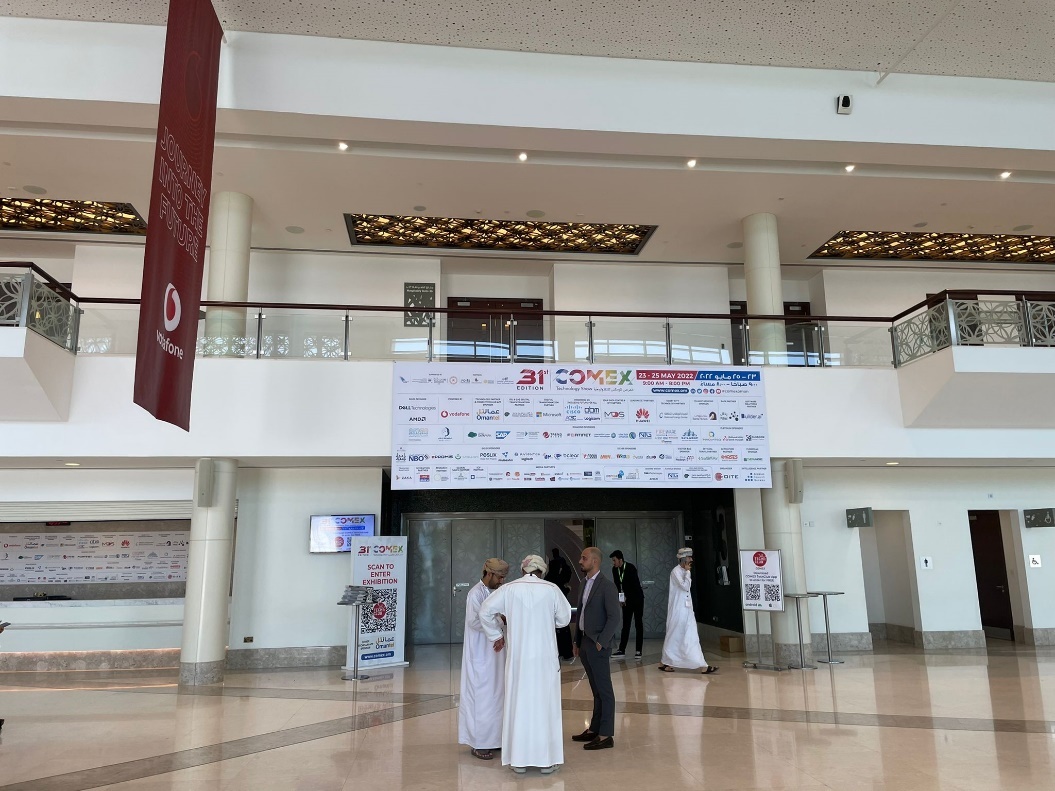
[Source: Self-photographed at KOTRA Muscat Trade Center]
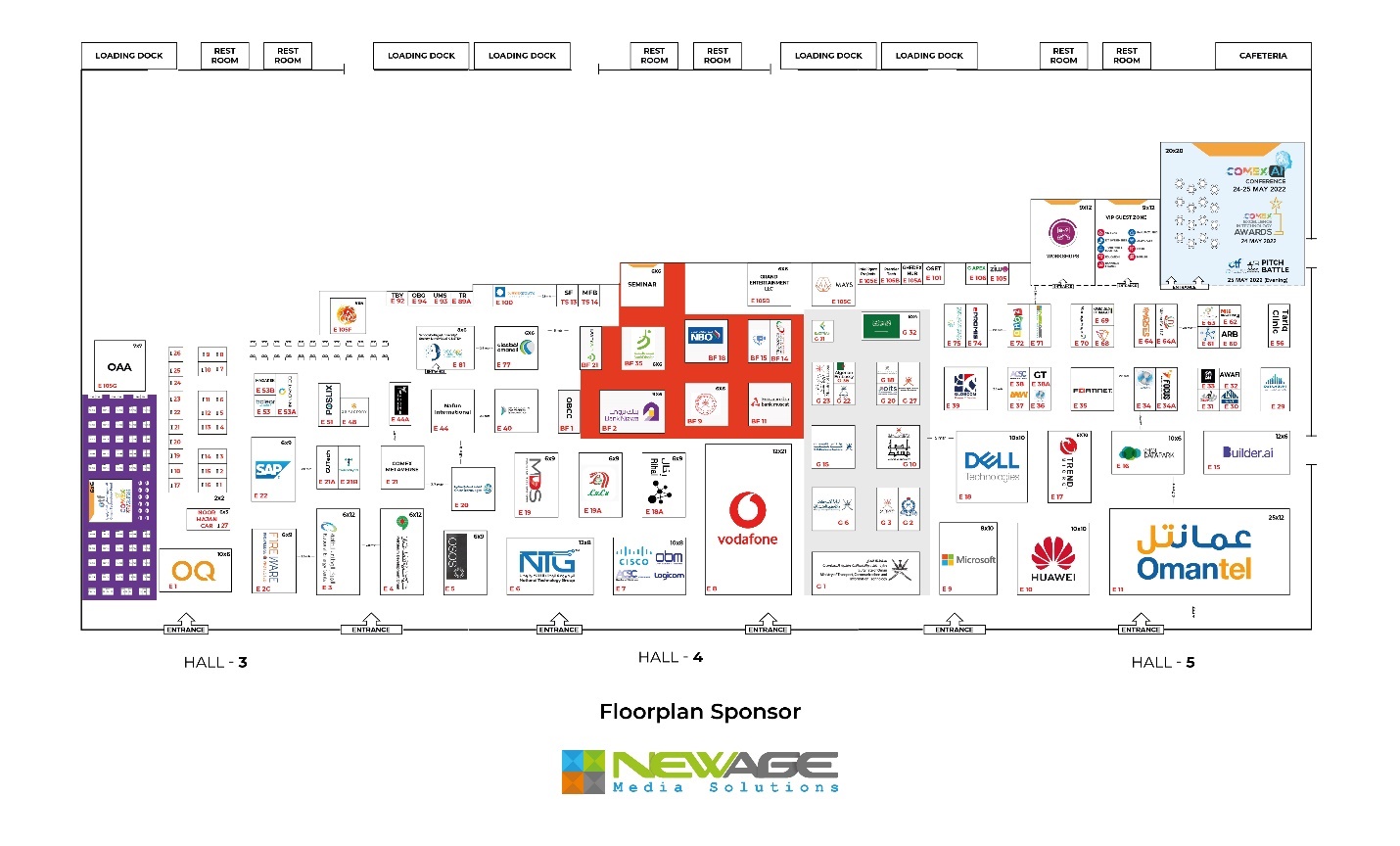
[Source: Comex.om]
This exhibition was held in a hybrid way, and a virtual exhibition hall was also prepared for visitors who were unable to attend face-to-face. The virtual pavilion can be experienced at https://www.youtube.com/watch?v=ZHRHeLJMIXI.
Meanwhile, cutting-edge technologies such as robots, cybersecurity solutions, artificial intelligence, and smart city technologies that guarantee the convenience and speed of human life, innovation, and digital services were the main exhibit items at the 31st COMEX exhibition.
Easy Meal, POSLIX – Qrlix
One of the most inconvenient parts of Omani dining culture is having to wait for the waiter to bring the menu or bill, and Qrlix from Omani-based IT company POSLIX offers a solution to this problem. According to an interview with POSLIX sales manager Asma Al Balushi, Qrlix was developed in Oman in May 2022 to allow easy ordering through an app. Customers scan the QR code at the table to view the menu, choose what they want, and order. The customer's order is transmitted to the kitchen screen, and when the food is cooked, the dining hall staff's smart watch notifies that the order is ready and the table number that needs to be served is transmitted.
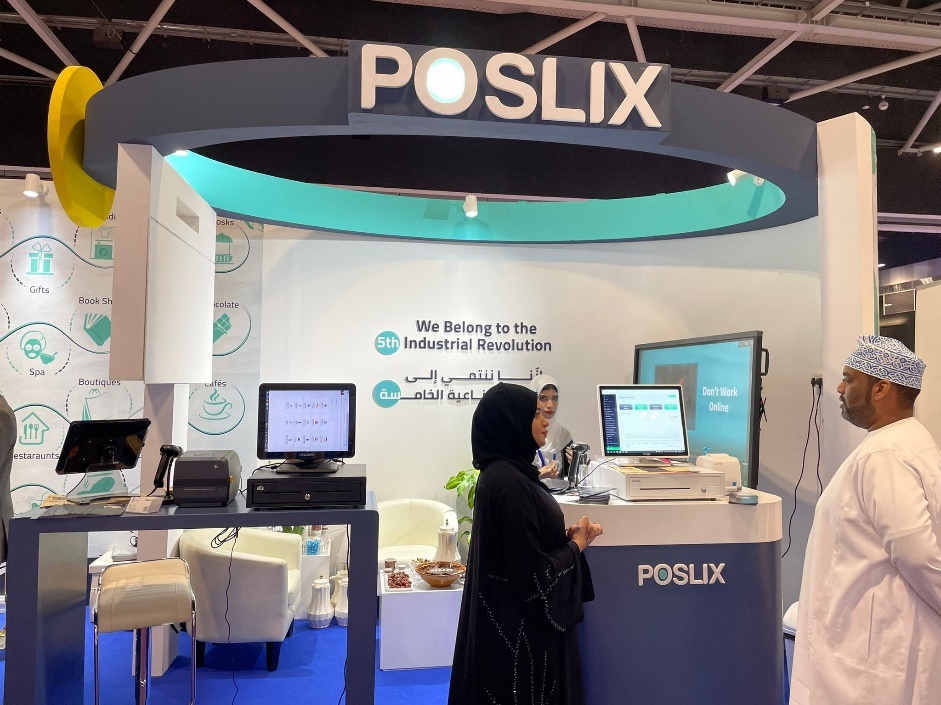
[Source: Self-photographed at KOTRA Muscat Trade Center]
Expanding use of industrial drones, Ibn Firnas Drone Center – M30
Ibn Firnas Drone Center, an Omani agent for Chinese DJI drones, also participated in the exhibition and introduced various drones, including the M30 drone. Drone engineer and pilot Abdullah Al Rashdi said in an interview with KOTRA Muscat Trade Officer that industrial drones can be used in a variety of fields in agriculture, environment, terrain survey, security, and oil and gas, and established a drone training center to train drone pilots in Oman. He also said that it is currently under discussion. According to the Oman Environment Agency, drones are being used as part of a conservation plan for areas with rare flora and fauna and can detect illegal intrusions. Drones are also being used for scanning and 3D mapping of terrain inaccessible to humans.
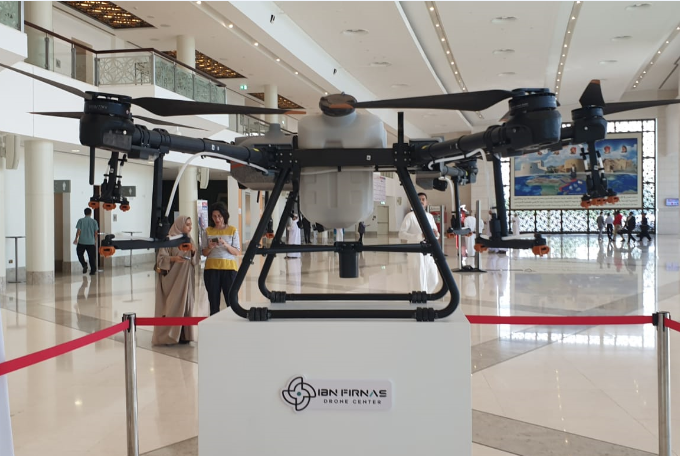
[Source: Self-photographed at KOTRA Muscat Trade Center]
Changing Payment Methods, Bank Muscat – Cashless Payments
Bank Muscat, one of the major banks in Oman, also participated in this exhibition and introduced a QR code-based cashless payment method. Said Al Harthy, Relationship Manager, introduced a QR code-based electronic payment option that allows payment or remittance by scanning a QR code using the Bank Muscat app. This QR code electronic payment method will benefit merchant partners and customers by improving financial inclusion and providing a convenient and secure means of payment, he added, and will be particularly useful for small and medium-sized enterprises (SMEs).
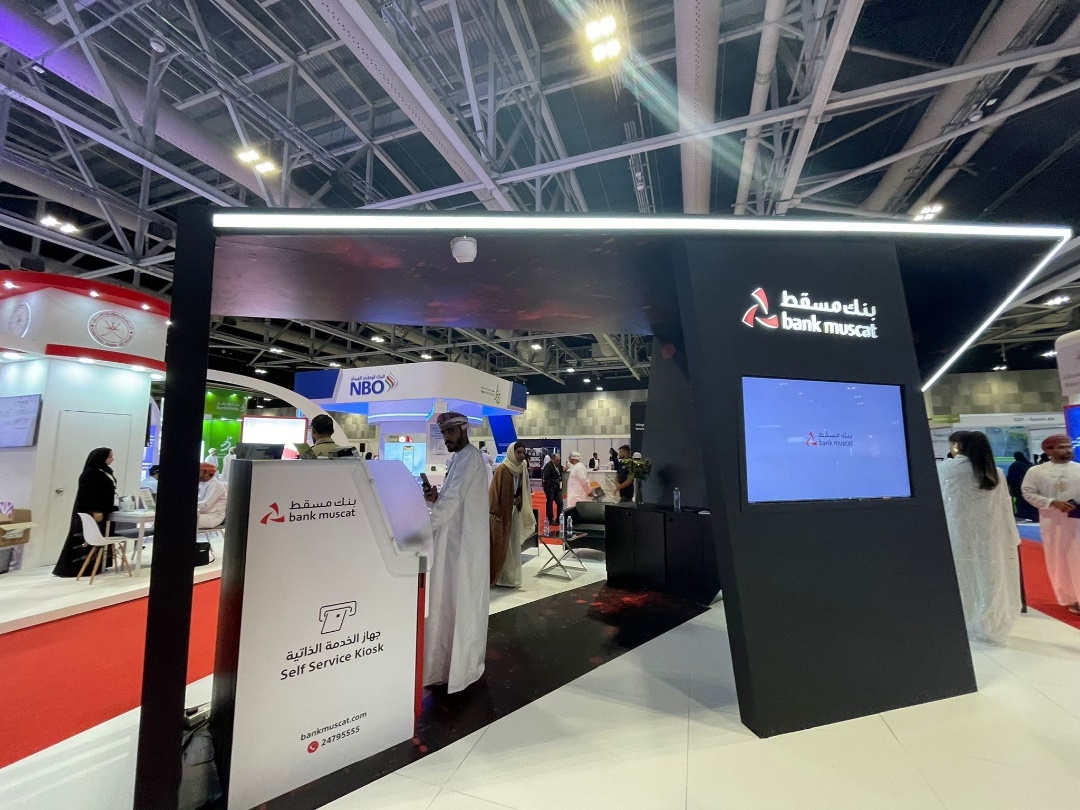
[Source: Self-photographed at KOTRA Muscat Trade Center]
Oman Electric Vehicles – Nur Majan and Mays
One of the main exhibition items in the COMEX technology sector is an electric vehicle under development in Oman. Oman is currently developing two electric vehicles, Nur Majan and Mays, and a prototype of the electric vehicle under development was exhibited at this COMEX. According to Sultan Al Amri, developer of Nur Majan, the Nur Majan's zero to hundred* takes 4 seconds, and is being developed to cover 2,250 miles (3621 km) on a single charge. In addition, it is said that it can be operated without maintenance for up to 21 years.
* The time the car travels from a standstill to 100 km/h
<Nur Majan electric car in Oman>

[Source: Self-photographed at KOTRA Muscat Trade Center]
In the case of Mays, another electric vehicle being developed by Oman, international standards are applied to all parts, and it aims to compete with foreign brands. According to Mays president Haider Al Zaabi, it has taken pre-orders for about 500 units so far, and plans to develop an SUV-type electric vehicle in the future. Mays has a futuristic design and is said to be designing a large screen inside the car to control everything. The Mays' zero to hundred is 4.9 seconds, and the top speed is 280 km/h. Meanwhile, the body will be made of 100% carbon fiber.
<Oman Electric Vehicle Mays>

[Source: Self-photographed at KOTRA Muscat Trade Center]
Oman ICT Strategy and e-Government
Through a royal decree in October 2020, the Ministry of Technology and Communication and the Information Technology Authority (ITA), which were in charge of the existing IT infrastructure projects and e-government initiatives in Oman, established the Ministry of Transport, Communications and Information Technology, MTCIT). Oman is in the process of building ICT infrastructure to provide broadband services to more than 2030% of urban areas and achieve broadband penetration of more than 90% by 75 through the National Broadband Strategy.
The Gulf States realized the importance of embracing the transition to e-government and implemented e-government initiatives early as part of their national plans. Oman Investment Agency (formerly Sovereign Wealth Fund) formed Oman ICT Group (OCIT) in early 2019 to focus on cloud and data services, cyber security and smart applications, and next-generation technologies. In the case of Oman, the national digital strategy e.Oman 2030 strategy was developed, and Oman's long-term development plan, Vision 2040, aims to enhance national technological capabilities, establish essential ICT infrastructure, and improve e-government services. It can be seen that the development of communication technology is prioritized.
The e.Oman 2030 strategy aims to build a strong foundation to benefit from the digitalization and technological change driven by the 4th industrial revolution. With the vision of “digital transformation of leadership, innovation for economic and social prosperity”, the IT sector’s contribution to GDP is increased, all public services are digitized, digital technology jobs are created, digital technology startups are nurtured, and cyber security and trust are in the top 10 countries. Entry is the main goal.
The UN's E-government Development Index is an index that combines three important aspects of e-government, such as online service provision, communication connectivity, and human competency. It is an indicator that evaluates the quality, relevance and usefulness of government websites that provide information and participatory services. According to these two indices, of the six GCC countries between 2016 and 2020, the UAE and Oman are the only countries where both indices have improved.
<E-Government Development Index Ranking (Left) and Electronic Participation Index Ranking (Right)>

[Source: PWC]
implication
At the 2021th Arab ICT Ministerial Meeting held in December 25, Muscat, the capital of Oman, was selected as the Arab Digital Capital 2022. Oman's strategic position in world trade, its potential as an international hub for data exchange, strong digital capabilities and infrastructure, a young technologically competent society, and an undersea cable enabling high-speed data exchange, all contribute to Muscat's deployment of Arab Digital in 2022. Contributed to being selected as the capital.
According to Saeed Bin Hamoud Al Maawali, Minister of Transport, Communication and Information Technology of Oman, the Omani Cabinet has contributed to the digital economy under the slogan “A digital future that creates opportunities”, which is consistent with the line of Oman’s economic diversification strategy Vision 2040. and adopted the National Digital Economy Program, which aims to expand the national economy. Oman's Ministry of Transport, Communications and Information Technology has identified three main areas: cybersecurity, digital innovation and digital competence to develop digital talent and skills in the Arab world, enrich Arab digital content, and strengthen cooperation on cybersecurity. and to encourage investment in the digital economy.
Oman is actively supporting the growth of the non-oil industry in various sectors, including ICT, for economic diversification, and is attempting to transition to e-government. Sultan Haisam, the new King of Oman, is accelerating the transformation to e-Government by urging the rapid implementation of the “National Unified E-Government Services Portal,” which will serve as an integrated platform for government services.
With the development of ICT in Oman, the demand for education and manpower training, e-government services, data centers, cyber security, block chain, Internet of Things (IoT), artificial intelligence (AI), and space technology is expected to increase. The biggest barrier to entry for Korean companies to enter the ICT sector in Oman is the language, and English is widely used in Oman. Price competitiveness is also an important factor in purchasing decisions, and it is important to have price competitiveness to compete with other IT countries such as India and Pakistan. In order to enter the market successfully, it is necessary to discover ICT projects and reduce trial and error by establishing cooperative relationships with partners with a high understanding of the local market.



